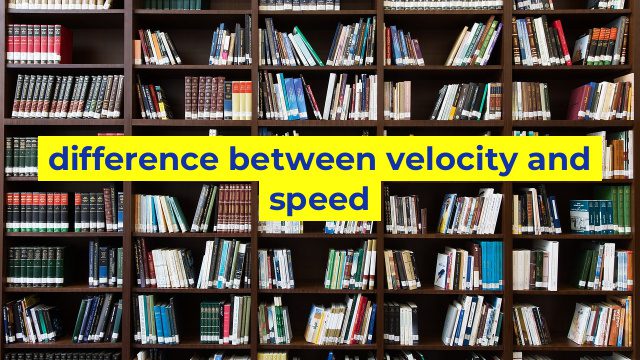The Difference Between Velocity and Speed: Understanding the Basics
When it comes to defining the terms “velocity” and “speed,” many people assume that they are interchangeable, and indeed they are often used synonymously in everyday conversation. However, in physics and engineering, velocity and speed have distinct definitions, and understanding the differences between the two is essential for anyone involved in these fields.
What is Speed?
Speed refers to the rate at which an object travels over a given distance. It is a scalar quantity, meaning that it has only magnitude but no direction. In other words, speed is simply a measurement of how fast something is moving, with no consideration of the direction in which it is moving.
For example, if a car travels 60 miles per hour on a straight road, its speed is 60 mph regardless of whether it is heading north, south, east, or west.
What is Velocity?
Velocity, on the other hand, is defined as the rate at which an object changes its position in a specific direction. Unlike speed, velocity is a vector quantity, meaning that it has both magnitude and direction.
Continuing with the example of the car, if it is heading north at 60 mph, its velocity would be 60 mph north. Alternatively, if it is heading south at 60 mph, its velocity would be 60 mph south.
Understanding the Differences
The main difference between speed and velocity is that velocity takes into account the direction of motion, while speed does not. This distinction is particularly important in physics and engineering, where precise measurement and calculation are essential.
For example, consider two objects that travel the same distance at the same speed but in opposite directions. As far as their speed is concerned, they are identical. However, their velocities are opposite, and if their paths were to intersect, they would collide with each other.
In conclusion, while velocity and speed are often used interchangeably in everyday communication, they have distinct meanings in physics and engineering. Understanding the differences between the two is crucial to accurately measure and calculate an object’s motion in the right direction.
Table difference between velocity and speed
| Parameter | Speed | Velocity |
|---|---|---|
| Definition | Distance travelled per unit time | Displacement per unit time in a particular direction |
| Scalar/Vector Quantity | Scalar | Vector |
| Formula | Speed = Distance / Time | Velocity = Displacement / Time |
| Example | A car travelling at a speed of 60 km/hr | A car travelling at a velocity of 40 km/hr towards the west |
| Unit | Kilometer per hour (km/hr) | Kilometer per hour towards a particular direction (km/hr, North/South/East/West) |
